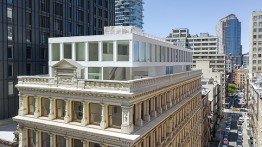Visiting Lecture | Shigeru Ban Architects: Sustainability + Design
Thursday, April 28, 2022, 6:30 - 8:30pm

Cast Iron House, 2017, Shigeru Ban Architects.
This lecture will be conducted in-person in room 315F and through Zoom. Zoom account registration is required, please register in advance here.
A presentation on Shigeru Ban Architects’ approach to sustainability and design with a detailed exploration of several notable projects.
The lecture will be followed by a discussion moderated by Samuel Anderson.
Dean Maltz is Managing Partner of Shigeru Ban Architects. Maltz began working with Shigeru Ban Architects in 1999 and is responsible for all SBA projects in North and South America. Notable projects include the AIA National Honor Award-winning Aspen Art Museum (2014), Metal Shutter House (2011), and the Nomadic Museum (2005). Maltz is currently overseeing the design of a 420-acre bourbon distillery park for Kentucky Owl in Bardstown, Kentucky, as well as the construction of the Terrace House condominium in Vancouver, BC, Canada. Upon completion, Terrace House will be one of the tallest hybrid mass timber towers in the world. Recently, Maltz has completed a luxury condominium, the Cast Iron House in New York, NY, published in September, 2021 issue of Architectural Record.
Dean Maltz is a licensed architect in New York and five other states and provinces in the United States and Canada. Maltz is a graduate of the Cooper Union School of Architecture (Bachelor of Architecture, 1984) and Harvard Graduate School of Design (Master of Architecture, 1986). He has taught at numerous institutions, including Columbia University, Washington University, and Cornell University.
The in-person lecture is open to Cooper Union students, faculty, and staff in room 315F only. This event is accessible to the public through Zoom.
Located at 7 East 7th Street, between Third and Fourth Avenues




